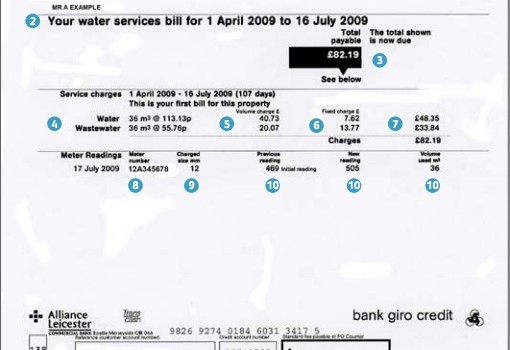
Water bills in the UK
In the UK, the majority of households get their fresh water from the mains and they are charged in one of two ways:
- Unmeasured – Households pay a set amount for water each year, regardless of the volume used (this is the case for about two thirds of homes).
- Measured – Households have a water meter installed that charges the user based on the volume of water they use.
Regardless of whether the household is metered or not, in the water bill there is also a charge for water to be removed from the property (mostly greywater, for example when water runs down the sink) and surface water drainage, which is the cost associated with draining rainwater away from your property.
On the whole, properties built prior to 1990 are unmetered and therefore pay the unmeasured charge, while properties built after this date tend to have meters and therefore pay the measured rate.
The unmeasured charges are based upon the 1989/90 rateable value of the property. The rateable value of properties varies dramatically, and is based on the notional rental value of the property taking into account factors including the location, size and type of the property.
Should I get a water meter? The rule of thumb
From a money-saving perspective, both the measured and unmeasured tariffs can be beneficial depending on the particular situation of the household. Unfortunately if you are metered you cannot go back to the unmeasured tariff. However you can move from an unmeasured tariff to a measured tariff, by requesting your water supplier installs a water meter at your property.
In this example scenario, we will highlight the situation in which this might be a good idea.
Your home is a 1970s property, and the property next door is a similar age and size. There are 5 people living next door, while in your home there is just you. Since it is highly likely you will be paying the same 1989/90 rateable values and you will both be charged the same amount per year on your bill – although their usage is likely to be 4x higher than yours.
In this situation it would make sense to have a water meter installed in the property. The general rule of thumb to help make this decision easier is as follows:
If you have more bedrooms in the property in your property than people living there, then you should consider installing a water meter.
For a more accurate assessment of your property, the Consumer Council for Water has developed a handy little tool to help you decide whether it is cheaper to go for a meter if you are currently being charged based on the rateable value (i.e. you are unmeasured) which can be found here.
So you might think that if you are using water based on the rateable value, it is really irrelevant on how much water you use, because your bill will remain the same. Unfortunately this isn’t the case!
Linking water to energy bills
What’s the relationship between energy bills and using water?
Well it’s likely that much of the water you use in your property will be heated, in fact it is estimated that 25% of the average UK family’s energy bill is spent on heating hot water.
Therefore regardless of whether you are have a water meter fitted or you live in an unmetered property, being a little bit more careful with the way you use water could translate into significant money savings on your energy bills!
There is the added benefit that using less water helps to save the planet, since 5% of the UK’s greenhouse gas emissions are caused by residential homes heating water, therefore the less water that gets heated, the less CO2 that is released into the environment.
Our two top tips:
1. Determine whether you would be better off having a water meter or not based on your living arrangements.
2. Use less water, even if your bills are fixed. The less water you use, the less you need to heat.












No Comments yet! Be the first one.